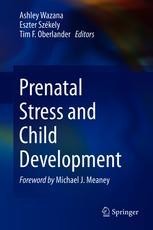
When Dr. Tim Oberlander was first hired at Sunny Hill Health Centre more than 25 years ago, he treated developmental problems in infants and children with prenatal exposure to cocaine and methadone and noticed something he didn’t expect.
“Shortly after I started, I began to see that even in the face of early adverse life circumstances, a wide range of development was possible,” says Dr. Oberlander, a BC Children’s Hospital investigator and developmental pediatrician, who also holds an R. Howard Webster Professorship in Brain Imaging and Early Child Development. “This led me to ask questions about how a mother’s mental health during pregnancy, the genes children inherited from their parents and their living environment might contribute to such variations in development.”
Oberlander’s subsequent research has reported new findings about early brain development and behaviour in infants and children of depressed mothers. This has included recent findings using state-of-the-art MRI scans to study the effects of SSRI antidepressants on the developing brain as well as studies examining the role of the everyday home environment and cognitive skills.
 It’s this kind of innovative research that led Dr. Oberlander to collaborate with colleagues Dr. Ashley Wazana and Dr. Eszter Székely, both scientists at McGill University, to co-edit a new book called “Prenatal Stress and Child Development,” covering current knowledge in the field of prenatal stress.
It’s this kind of innovative research that led Dr. Oberlander to collaborate with colleagues Dr. Ashley Wazana and Dr. Eszter Székely, both scientists at McGill University, to co-edit a new book called “Prenatal Stress and Child Development,” covering current knowledge in the field of prenatal stress.
In this volume, a diverse array of authors synthesize key findings from research into prenatal stressors affecting pregnancy, including preconception stress, prenatal maternal depression, anxiety and pregnancy-specific experiences. Chapters explore how prenatal stress affects cognitive, affective, behavioral and neurobiological development in children while pinpointing core processes of adaptation, resilience and interventions that may reduce negative behaviors and promote optimal outcomes in kids.
Key areas covered include intergenerational transmission of parental early life stress, the microbiome-gut-brain axis and the effects of prenatal stress on early neurodevelopment, and prenatal stress on children’s sleeping behavior.
Written for researchers, professors, graduate students, clinicians and therapists, “Prenatal Stress and Childhood Development” aims to inform clinical strategies and future research targeting prenatal stress and its cyclical impact on subsequent generations.
“The book speaks to the array of influences on of the human journey,” says Dr. Oberlander.
“It’s not just that exposure to early life adversity alters brain development and behaviour, but that we can identify factors that contribute to positive developmental outcomes.
This is exciting news because these factors can help us develop interventions to promote health and well-being for mothers and their children”.
Oberlander authored two chapters that review the developmental effects of antidepressants and the role the gut microbiome plays in shaping early brain development and behavior.

Dr. Ruth Grunau, an investigator at BC Children’s and a professor in pediatrics at the University of British Columbia, contributed a chapter on the effects of stress related to painful life-saving procedures during fetal life ex-utero in babies born very prematurely.
Her multidisciplinary studies have found that high levels of pain-related stress early in life can have lasting effects on brain development, stress regulation and neurodevelopment of babies born very preterm. Her work highlights the importance of reducing stress and pain in premature babies.
The chapter she wrote with her postdoctoral fellow Dr. Terri Levine reviews the effects of repeated exposures to pain-related stress during neonatal intensive care, during a critical period of rapid brain development and programming of stress hormone regulation, which typically occurs in utero. She describes the associations between early pain-related stress and altered brain microstructure and function, cortisol levels, epigenetic changes, sleep and neurodevelopmental outcomes, as well as genetic variations that moderate the risk of long-term effects.
Dr. Oberlander stresses that understanding and alleviating prenatal stress is relevant for everyone.
“This is not just an area of research relevant to a select group of women who experience stress or mood disturbances during pregnancy. We are living through an unprecedented global pandemic that affects all of us,” he says.
“We need to think about perinatal stress as a pressing public health issue that has an impact across two generations with effects that last a lifetime. This should matter to all of us.”




